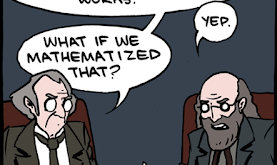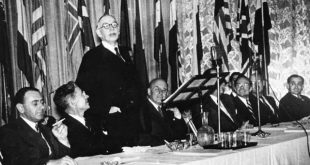The other great transformation I have discussed Polanyi on the blog before, but not in great detail (see this video posted a few years back from Fred Block for a more in depth discussion). However, writing about Bob Heilbroner's views of economics, and in particular the labor theory of value, reminded me why I have reservations about Polanyi, something that often surprises my friends, since I often cite some of his ideas, and I did put his book on the Top 10 list.Polanyi has been,...
Read More »Keynes and the death of capitalism
In a recent article for the New Statesman, the economics commentator Grace Blakeley makes an extraordinary claim. Writing about the origins of the IMF, she says: Seventy-five years have passed since these international financial institutions were created in Bretton Woods, New Hampshire, in 1944. Back then, delegates sought to tame the power of international finance, the growth of which helped to cause the 1929 Wall Street Crash and the ensuing Great Depression. JM Keynes – who led the...
Read More »1919: Keynes’s revolutionary plan for the global economy
12 November, 2018 This year is the 150th anniversary of the TUC, and the 70th anniversary of the Trade Union Advisory Committee to the OECD. As part of the celebration of these achievements, the TUC’s Economics and Social Affairs department organised an event “Lessons from the Great Financial Crisis” – on 12th November, 2018 – the day after Armistice day, and 100 years after the ending of the First World War. Several speakers, including ex-Prime Minister Gordon Brown, were invited to...
Read More »On Modern Monetary Theory and Some Odd Twists and Turns in the Evolution of Macroeconomics
Mainstream neoclassical economics is hooked on the idea of individual worker-savers as prime movers in capitalist market economies. As workers, individuals choose how much to work, determining the economy’s output; as savers, they determine how much of that output takes the shape of the economy’s capital investment. With banks as conduits channeling saving flows into investment, firms churn inputs into outputs that match worker-savers’ tastes. In this way, the neoclassical world gets...
Read More »Modern Money Theory: How I Came to MMT and What I Include in MMT
L. Randall Wray | October 1, 2018 My remarks for the 2018 MMT Conference, September 28-30, NYC. I was asked to give a short presentation at the MMT conference. What follows is the text version of my remarks, some of which I had to skip over in the interests of time. Many readers might want to skip to the bullet points near the end, which summarize what I include in MMT. ****************************************************************************** As an undergraduate I...
Read More »Il Keynes incompiuto della sinistra italiana
Ripubblichiamo un bell'intervento di Vincenzo Maffeo su il manifesto del 3 aprile 2018 La sinistra e i contenuti, ovvero Keynes e la mucca nel corridoio di Vincenzo Maffeo Non ci si è resi conto che l’abbattimento della precarietà del lavoro è il presupposto imprescindibile di una politica coerente per l’occupazione Una ricostruzione della sinistra in Italia non può prescindere da una critica impietosa che riguardi i contenuti della proposta politica prima che il modo in cui essa è...
Read More »Was Keynes a Keynesian?
Mike Beggs wrote an interesting Review of the book In the Long Run We Are All Dead (which I started, but have not finished yet). Beggs argues that: "Marx lived long enough to declare himself 'not a Marxist.' Keynes was not so lucky. Followers would make the distinction between 'Keynesian economics' and 'the economics of Keynes.' But by then the word had well and truly transcended the man." That's not altogether correct. Dave Colander retells the Abba Lerner story of Keynes' famous...
Read More »Understanding Macro: The Great Depression (1/3)
from Asad Zaman Preliminary Remarks: “The trouble is not so much that macroeconomists say things that are inconsistent with the facts. The real trouble is that other economists do not care that the macroeconomists do not care about the facts. An indifferent tolerance of obvious error is even more corrosive to science than committed advocacy of error.” From The Trouble with Macroeconomics (Paul Romer) Personally, I do not understand why indifference to error is worse than committed...
Read More »Keynes’ intellectual influence: the theorist vs the pamphleteer
Keynes' 1933 and 1929 pamphlets, respectively One of the many unfair criticisms of Keynes' General Theory (GT) is that is badly written or somewhat incomprehensible. Note that Keynes started to write it in 1932, four years into the Depression, and two years after publishing the Treatise, which he probably thought was going to be his Magnus Opus. In other words, by the time he started to write the GT the worst part of the Depression was coming to an end (the UK had abandoned gold in 1931, and...
Read More »Gramsci e Sraffa, un legame profondo fra lotta politica e teoria critica
Pubblichiamo la recensione a un libro di Giancarlo De Vivo uscita su Micromega online Tra Gramsci e Sraffa, il sodalizio fra due comunisti indisciplinati Sergio Cesaratto La figura di Piero Sraffa è perlopiù sconosciuta al grande pubblico italiano, persino a quello più colto; appena più fortunata è la figura di Antonio Gramsci. Eppure si tratta di due degli studiosi sociali più straordinari –i più straordinari – che il nostro Paese può vantare nel ventesimo secolo. Il volume di...
Read More » Heterodox
Heterodox






